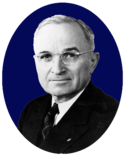1944 Democratic National Convention
|
1944 presidential election |
|
 
Nominees
Roosevelt and Truman |
|
| Convention | |
|---|---|
| Date(s) | July 19–21, 1944 |
| City | Chicago, Illinois |
| Venue | Chicago Stadium |
| Candidates | |
| Presidential nominee | Franklin D. Roosevelt of New York |
| Vice Presidential nominee | Harry S. Truman of Missouri |
| Voting | |
| Total delegates | 1,176 |
| Votes needed for nomination | 589 (majority) |
| Results (President) |
Roosevelt (NY): 1,086 (92.35%) Byrd (VA): 89 (7.56%) Farley: 1 (0.09%) |
| Results (Vice President) |
Truman (MO): 1,031 (87.67%) Wallace (IA): 105 (8.93%) Cooper (TN): 26 (2.21%) Barkley (KY): 6 (0.51%) Others: 7 (0.6%) |
The 1944 Democratic National Convention was held at the Chicago Stadium in Chicago, Illinois from July 19 to July 21, 1944. The convention resulted in the nomination of President Franklin D. Roosevelt for an unprecedented fourth term. Senator Harry S. Truman of Missouri was nominated for Vice President. Including Roosevelt's nomination for the vice-presidency in 1920, it was the fifth time Roosevelt had been nominated on a national ticket. The keynote address was given by Governor Robert S. Kerr of Oklahoma, in which he "gave tribute to Roosevelt's war leadership and new deal policies."
Unlike the previous convention, President Roosevelt faced no serious opposition for a fourth term, with the country's active involvement in World War II and the consequent need for stable leadership considered a more pressing issue than any concerns about his remaining in office. Several Southern delegates who were opposed to Roosevelt's racial policies tried to draft Virginia senator Harry F. Byrd to run for the Presidential nomination, but Byrd decided against actively campaigning against the President. In the end, Byrd did win more delegates than any of the candidates who had tried to run against Roosevelt four years prior, but this still fell far short of seriously challenging for the nomination.
Roosevelt was nominated on the first ballot:
Despite the obvious physical decline in the President's appearance, as well as rumors of secret health problems, Roosevelt's fourth nomination as President was largely unchallenged. The contention lay in the vice-presidential nomination. Henry Wallace had been elected Vice President in 1940. He was FDR's preferred choice and was very popular with rank and file Democratic voters. However, conservative Party leaders, such as James F. Byrnes, strongly opposed his renomination. They regarded Wallace as being too far to the left, too "progressive" and too friendly to labor to be next in line for the Presidency. Outgoing Democratic National Committee chairman Frank C. Walker, incoming chairman Robert E. Hannegan, party treasurer Edwin W. Pauley, strategist Edward J. Flynn, Chicago Mayor Edward Joseph Kelly and lobbyist George E. Allen all wanted to keep Wallace off the ticket. Their group was deemed by Allen as "The Conspiracy of the Pure in Heart." They privately told Roosevelt that they would fight Wallace's renomination, and they proposed Missouri Senator Harry S. Truman as FDR's new running mate. Truman had entered the Senate in January 1935 with a reputation as "the senator from Pendergast". Then he had become well known during the war as the chairman of a Senate investigating committee. Roosevelt personally liked Wallace and knew little about Truman, but he reluctantly agreed to accept Truman as his new running mate to preserve party unity.
...
Wikipedia
